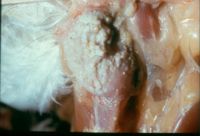Difference between revisions of "Yeast-like Fungi - Flashcards"
Jump to navigation
Jump to search
m |
|||
| Line 120: | Line 120: | ||
||<font color="white"> <big> | ||<font color="white"> <big> | ||
*'''''Oily areas''''' | *'''''Oily areas''''' | ||
| − | *'''''Ear canal''''' | + | **'''''Ear canal''''' |
| − | *'''''Skin''''' | + | **'''''Skin''''' |
||[[Yeast-like fungi#Malassezia pachydermidis|<span title="Answer article">Link to Answer Article</span>]] | ||[[Yeast-like fungi#Malassezia pachydermidis|<span title="Answer article">Link to Answer Article</span>]] | ||
|- | |- | ||
| Line 132: | Line 132: | ||
|} | |} | ||
<br> | <br> | ||
| + | |||
==<font color="purple">Rhodotorula</font>== | ==<font color="purple">Rhodotorula</font>== | ||
{| border="3" cellpadding="8" | {| border="3" cellpadding="8" | ||
Revision as of 16:28, 17 May 2009
|
|
Candidosis
| Question | Answer | Article |
|---|---|---|
| What are the three important species of Candida in animal infections? |
|
Link to Answer Article |
| What are the clinical signs of a sour crop infection? |
|
Link to Answer Article |
| What other conditions are Candida spp. implicated in? |
|
Link to Answer Article |
| How would you demonstrate a Candida infection? |
|
Link to Answer Article |
Cryptococcosis
| Question | Answer | Article |
|---|---|---|
| What is the main pathogenic species of Cryptococcus? |
|
Link to Answer Article |
| Where is Cryptococcus found in the environment? |
|
Link to Answer Article |
| Which body systems are affected? |
|
Link to Answer Article |
| Where is the most common site of infection in cats? |
|
Link to Answer Article |
| How would you demonstrate a cryptococcosis infection? |
|
Link to Answer Article |
Geotrichosis
| Question | Answer | Article |
|---|---|---|
| Which organs are usually affected in geotrichosis infections? |
|
Link to Answer Article |
| True or False: Geotrichosis infections are usually diagnosed post-mortem |
|
Link to Answer Article |
Malassezia pachydermidis
| Question | Answer | Article |
|---|---|---|
| Where in the body is Malassezia pachydermidis usually found? |
|
Link to Answer Article |
| What is the pathogenesis of Malassezia pachydermidis infections? |
|
Link to Answer Article |
Rhodotorula
| Question | Answer | Article |
|---|---|---|
| What infections of dogs and horses are Rhodotorula spp. involved in? |
|
Link to Answer Article |
Torulopsis glabrata
| Question | Answer | Article |
|---|---|---|
| What infections are Torulopsis spp. involved in? |
|
Link to Answer Article |
Trichosporonosis
| Question | Answer | Article |
|---|---|---|
| What infection is T. capitum involved in? |
|
Link to Answer Article |
| What infections are Trichosporonosis beigelii involved in? |
|
Link to Answer Article |
